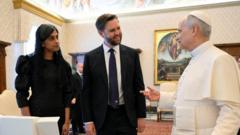Recent hospitalizations have prompted discussions about the governing dynamics of the Catholic Church amidst the Pope's absence.
Pope Francis' Health Crisis Sparks Governance Questions in the Vatican

Pope Francis' Health Crisis Sparks Governance Questions in the Vatican
As Pope Francis navigates his recovery from pneumonia, concerns arise over Vatican decision-making leadership and continuity.
Despite spending two weeks hospitalized with significant pneumonia, Pope Francis has managed to maintain his duties, approving the appointment of bishops and progressing candidates for sainthood. His active governance raises urgent questions about the Vatican's hierarchical framework during periods of the Pope's incapacity.
Vatican statements underline that the 88-year-old pontiff remains in contact with his aides and continues making decisions from his hospital bed, though his direct engagement with the faithful has decreased. "Francis is still governing; he is in contact with his aides," asserted Matteo Bruni, the Vatican spokesman. However, the Pope's absence from public events, such as general audience gatherings, signals a shift in the Vatican's communication strategy amid his health struggles.
The Vatican confirmed that while Francis's condition has seen improvements, he still requires careful monitoring. He is currently alternating between oxygen therapy and a ventilation mask, engaging in respiratory physiotherapy to support his recovery. A recent bulletin states he is no longer in critical condition yet continues to be at risk.
The prolonged hospitalization has not only affected the public's perception of the Pope's health but also highlighted the intricacies of governance within the Catholic Church, questioning who truly governs when the Pope's presence is diminished. As the Church waits for Francis's full recovery, the ability to uphold its mission without his physical presence prompts reflection on leadership structures and future directions for the Vatican.
Vatican statements underline that the 88-year-old pontiff remains in contact with his aides and continues making decisions from his hospital bed, though his direct engagement with the faithful has decreased. "Francis is still governing; he is in contact with his aides," asserted Matteo Bruni, the Vatican spokesman. However, the Pope's absence from public events, such as general audience gatherings, signals a shift in the Vatican's communication strategy amid his health struggles.
The Vatican confirmed that while Francis's condition has seen improvements, he still requires careful monitoring. He is currently alternating between oxygen therapy and a ventilation mask, engaging in respiratory physiotherapy to support his recovery. A recent bulletin states he is no longer in critical condition yet continues to be at risk.
The prolonged hospitalization has not only affected the public's perception of the Pope's health but also highlighted the intricacies of governance within the Catholic Church, questioning who truly governs when the Pope's presence is diminished. As the Church waits for Francis's full recovery, the ability to uphold its mission without his physical presence prompts reflection on leadership structures and future directions for the Vatican.




















